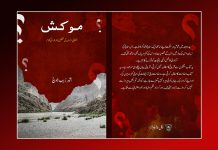Author: Dadshah Baloch
Banuk Karima was born on March 8, 1983, in Tump, Kech, Balochistan, and tragically passed away on December 20, 2020, at the age of 37. She began her struggle for Balochistan’s independence in 2005. Her journey started in Turbat, where she attended her first protest, holding a picture to demand the safe recovery of abducted individuals.
From that protest, her path as an activist began. She progressed to become a member of the Baloch Students Organization (BSO) and later made history as the first woman chairperson of the organization. In 2006, she played a significant role in various mass mobilizations and traveled extensively across Balochistan to inspire and organize people.
By 2009, the situation in Balochistan worsened. Many of her fellow members were brutally killed, and thousands were forcibly disappeared. That same year, Zakir Majeed, the vice chairman of BSO, was abducted by Pakistan’s secret agencies and remains missing to this day. Banuk Karima emerged as a prominent political figure, seen as a significant threat to the state’s control.
Despite relentless repression, she rekindled hope among the people of Balochistan, motivating them to resist oppression. Her efforts inspired a revolutionary spirit that refused to be extinguished. After her untimely death, many women in Balochistan rose up, protesting against state barbarism and continuing the fight for justice and freedom, carrying forward Banuk Karima’s legacy.
In recent years, women like Shari Baloch have taken this struggle to new levels. In April 2022, a 30-year-old mother targeted Chinese instructors at Karachi University, killing four people, including three Chinese nationals. The Baloch Liberation Army’s (BLA) media outlet, Hakkal, claimed responsibility for the attack, carried out by the first female member of the Majeed Brigade’s fidayeen unit.
Shari Baloch, a 30-year-old secondary school teacher from Kech, Balochistan, held a master’s degree and came from a prominent family of doctors, educators, and activists. Her decision to carry out a suicide bombing shocked the world and redefined the role of women in the insurgency. Shari’s actions underscored the deepening involvement of women in militant resistance, challenging traditional gender roles.
The second female suicide bombing occurred in June 2023. Sumaiya Qalandrani Baloch, born on August 17, 1997, in Tootak, Kuzdar, targeted a convoy of Pakistani militants in Turbat, Balochistan. Hakkal claimed responsibility for the attack, noting Sumaiya’s previous role in their media wing. Sumaiya, also known as Alias Sammo, was a computer science graduate and the fiancée of Rehan Baloch, who carried out an earlier attack in Dalbandin in 2018. Her sacrifice added to the evolving narrative of Baloch women’s active involvement in the armed struggle.
The third female suicide bomber, Mahal Baloch, participated in Operation Herof on August 25, 2024. She detonated her car at the gate of the Bela Army Headquarters. A 22-year-old law student at the University of Turbat, Mahal, also known as Alias Zilan Kurd, shared her name with a Kurdish fighter who carried out a similar attack in 1996. Mahal’s sacrifice further solidified the active role of women in the Baloch National Struggle, emphasizing equality in resistance.
Meanwhile, women like Dr. Mahrang and Sammi Deen Baloch continue to lead political movements inspired by Banuk Karima’s philosophy. Dr. Mahrang became an activist after her father’s forced disappearance. Born in 1993 in Kalat, she graduated as a medical doctor from Bolan Medical College. In December 2023, she led a march from Turbat to Islamabad against Baloch genocide. Despite facing severe resistance and police brutality, she stood firm, exemplifying the resilience and courage of Baloch women.
At the core of their struggle lies Banuk Karima’s enduring philosophy: the fight for freedom transcends gender. Her tireless efforts to mobilize Baloch society against state oppression, enforced disappearances, and extrajudicial killings have inspired a generation of women to take up the mantle of resistance.
Today, Banuk Karima’s legacy lives on in thousands of Baloch women who stand united in the fight for equality and justice. She proved that in the struggle for liberation, everyone—regardless of gender—is a warrior. Her spirit continues to inspire both political activism and armed resistance.
Karima, you live forever in our hearts,
You are the hope for a free Balochistan.
Disclaimer: The views and opinions expressed in this article are those of the author and do not necessarily reflect the official policy or position of The Balochistan Post or any of its editors.




























